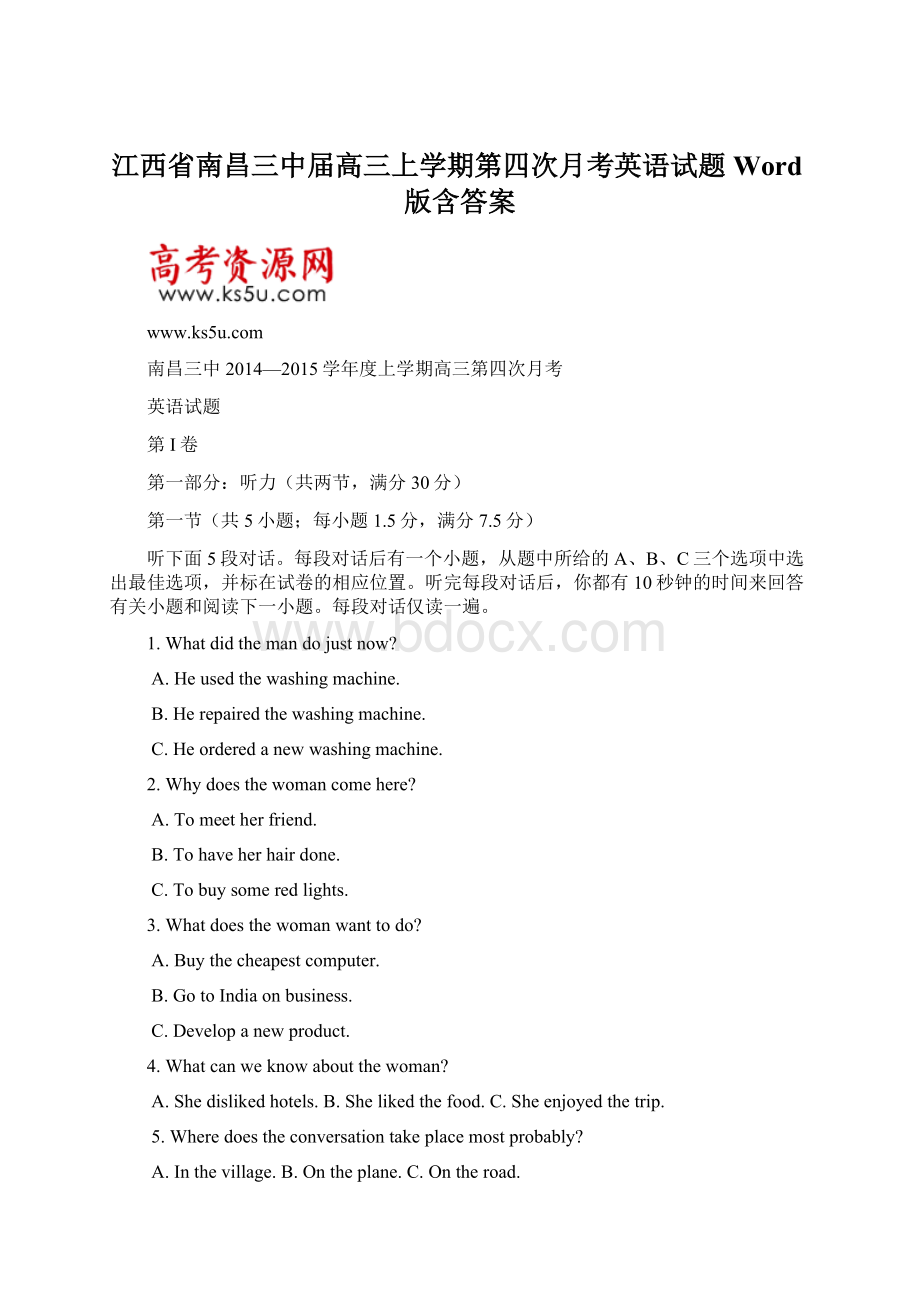江西省南昌三中届高三上学期第四次月考英语试题 Word版含答案.docx
《江西省南昌三中届高三上学期第四次月考英语试题 Word版含答案.docx》由会员分享,可在线阅读,更多相关《江西省南昌三中届高三上学期第四次月考英语试题 Word版含答案.docx(14页珍藏版)》请在冰豆网上搜索。

江西省南昌三中届高三上学期第四次月考英语试题Word版含答案
南昌三中2014—2015学年度上学期高三第四次月考
英语试题
第I卷
第一部分:
听力(共两节,满分30分)
第一节(共5小题;每小题1.5分,满分7.5分)
听下面5段对话。
每段对话后有一个小题,从题中所给的A、B、C三个选项中选出最佳选项,并标在试卷的相应位置。
听完每段对话后,你都有10秒钟的时间来回答有关小题和阅读下一小题。
每段对话仅读一遍。
1.Whatdidthemandojustnow?
A.Heusedthewashingmachine.
B.Herepairedthewashingmachine.
C.Heorderedanewwashingmachine.
2.Whydoesthewomancomehere?
A.Tomeetherfriend.
B.Tohaveherhairdone.
C.Tobuysomeredlights.
3.Whatdoesthewomanwanttodo?
A.Buythecheapestcomputer.
B.GotoIndiaonbusiness.
C.Developanewproduct.
4.Whatcanweknowaboutthewoman?
A.Shedislikedhotels.B.Shelikedthefood.C.Sheenjoyedthetrip.
5.Wheredoestheconversationtakeplacemostprobably?
A.Inthevillage.B.Ontheplane.C.Ontheroad.
第二节(共15小题;每小题1.5分,满分22.5分)
听下面5段对话或独白。
每段对话或独白后有几个小题,从题中所给的A、B、C三个选项中选出最佳选项,并标在试卷的相应位置。
听每段对话或独白前,你将有时间阅读各个小题,每小题5秒钟;听完后,各小题将给出5秒钟的作答时间。
每段对话或独白读两遍。
听第6段材料,回答第6至8题。
6.Whatarethespeakerstalkingabout?
A.Work.B.Hobbies.C.Dream.
7.Whatdoesn'tthemando?
A.paint.B.Playfootball.C.Watchmatches.
8.Whatkindofbooksdoesthemanlikereading?
A.Truestories.B.Sciencefiction.C.Travelmagazines.
听第7段材料,回答第9至11题。
9.Howdoesthemanfeelnow?
A.Embarrassed.B.Anxious.C.Happy.
10.Whatkindofbusinesswillthemanopen?
A.Alawyer'soffice.B.Agrocerystore.C.Arestaurant.
11.Howmanyemployeesdoesthemanhaveprobably?
A.300.B.550.C.600.
听第8段材料,回答第12至14题。
12.Whatdoesthemanplantodothisweekend?
A.Gocanoeing.B.Gocamping.C.Gofishing.
13.Whatistheweatherlikethisweekendaccordingtotheforecast?
A.Warmandsunny.B.Stormyandcold.C.Cloudybutwarm.
14.Whendoesthewomanusuallymakeweekendplans?
A.OnFridaymorning.
B.OnThursdayevening.
C.OnSaturdaymorning.
听第9段材料,回答第15至17题。
15.Whatisthemandoingnow?
A.Promotinghisarticles.
B.Coveringtheevent.
C.Lookingforajob.
16.Whatisoneofhisarticlesabout?
A.AjourneyinAustria.B.AvillageinThailand.C.Hiscollegelife.
17.Howmuchdoesthemanearnayear?
A.10,000dollars.B.100,000dollars.C.120,000dollars.
听第10段材料,回答第18至20题。
18.WhatdidtheBritishorderCooktofind?
A.Themissingexplorers.
B.Anewsoutherncontinent.
C.ThemapsofNewZealand.
19.WheredidCookreachduringhissecondvoyage?
A.Antarctica.B.TheArcticOcean.C.TheAntarcticCircle.
20.WhendidCookdieprobably?
A.In1779.B.In1775.C.In1772.
第二部分阅读理解(共2节,满分40分)
第一节(共15小题,每小题2分,满分30分)
阅读下列短文,从每题所给的四个选项(A、B、C和D)中,选出最佳选项。
A
Ifyousawanotherkidrideherbiketoofastaroundacornerandfalldown,youmightrideyourbikemoreslowlyonthatturn.Yes,wehumansareverysensitivetoothers'mistakes.Andthesameistrueforotheranimals.Animalsmessupallthetime.Theymighteatpoisonousleaves,falloffatreeorlettheirprey(猎物)slipaway.Bywatchingothersfail,ananimalcanavoidmakingthesamemistakes,thusimprovingitschanceofsurvival.
Scientistssuspectedthatonepartofthebrainhelpsanimalsprocessinformationaboutothers'errors.Cellsinthatpartappeartobecomemoreactivewhenapersonseessomeoneelsemakingamistake.Butresearchersdidn'tknowwhetherindividualcellsinthispartofthebrainplaydifferentrolesindetectingerrors.
Toinvestigatethebrain'sresponsetoerrorsinmoredetail,theresearcherstaughtagametotwomacaques,atypeofmonkey.Onemonkeycouldpressayelloworgreenbuttonwhiletheotherwatched.Ifthefirstmonkeypressedtherightbutton,theteamgavebothanimalsatreat.Everycoupleofrounds,thetwomonkeysswitchedroles.Meanwhile,thescientistsmonitoredindividualcellsintheanimal'sbrains.
Whenthefirstmonkeymessedupthegamebypressingthewrongbutton,agroupofcellsinthesecondmonkey'sbrainfired.Butifthesecondmonkeyalsomadethewrongchoiceduringitsturn,someofthecellsinthatgroupdidn'trespond.Thoseunresponsivecellsreactedspecificallytomistakesmadebyothers,nottothemonkey'sownmistakes.
Scientistsbelieveotherpartsofthebrainalsomighthelppeopleprocessinformationaboutanother'serrors."Youstarttothinkaboutthisotherpersonandseethingsfromhisangle."EllendeBruijn,toldScienceNews.ShestudiesthebrainattheUniversityofLeidenintheNetherlands.
21.AccordingtoParagraph1,animals'abilitytolearnfromothers'mistakes______.
A.usedtobeignoredbyhumansB.ensuresthattheywillneverfail
C.isbeinglostbecauseofhumansD.helpsthemtosurvivebetter
22.Theunderlinedword"detecting"inParagraph2probablymeans"______".
A.correctingB.makingC.sensingD.drawing
23.Intheexperimentmentioned,thoseunresponsivecellsareonlysensitiveto______.
A.thesamebuttonsB.others'mistakes
C.one'sownmistakesD.themonkey'sbrain
B
Duringtheteenageyears,hormonal(荷尔蒙的)changesleadtophysicalchangeslikerapidmusclegrowth,burstinheight,andweightgaininbothboysandgirls.Takealookattheinformationandheightandweightchartsforteenspresentedinthisarticleifthequestion“HowmuchshouldIweighformyageandheight”isbotheringyou.
AverageHeightandWeightChartsforTeens
Fastergrowthinkidsusuallycanbenoticedatage8.Geneticfactorsalsodeterminethephysicalgrowthofachild.So,itisperfectlynormalfortwokidsofthesameagetohavedifferentweightsandheights.Thefollowingfiguresshouldbeusedasguidelinesonly.
ForBoys
ForGirls
Age
Height
Weight
Height
Weight
inYears
inInches
inPounds
inInches
inPounds
12-13
58-62
85-100
60-63
95-105
14-15
63-66
105-125
63-64
105-115
16-17
67-70
130-150
64
115-120
18-20
68-70
150-160
64
125-130
IdealBodyFatPercentage
Fitmenhave14%-17%bodyfat.
Fitwomenhave21%-24%bodyfat.
Maleathleteshave6%-13%bodyfat.
Femaleathleteshave14%-20%bodyfat.
Theidealbodyfatpercentagevariesmainlyaccordingtoage,sexandthephysicalactivityoftheindividual.Butitisafactthatsomefemaleathleteshavebodyfataslowas10%andsomemaleathleteshadlowerthan4%bodyfat.So,itcanbeobservedthatotherthantheabovementionedfactors,geneticfactorsalsoinfluencethebody-fatratio.
BodyMassIndex(BMI)
YoumayusethefollowingformulatocalculateyourBMI:
AsperSIUnits(国际单位):
BMI=mass(kg)/[height(meters)]2
Imperial(英制的)Units1:
BMI=mass(Ib.)x703/[height(in.)]2
ImperialUnits2:
BMI=mass(Ib.)x4.88/[height(ft)]2
Followingconclusionscanbederivedfrom(得到)calculatingtheBMI:
BMICalculated
Conclusion
BMI18.5~25
Normaloridealweight
BMI>25
Overweight
BMI<18.5
Underweight
BMI<17.5
Extremelyunderweight
BMI=30orBMI>30
Obese(病态肥胖的)
BMI=40orBMI>40
Extremelyobese
24.AccordingtotheAverageHeightandWeightChartsforTeens,____.
A.girlskeepongrowingtallerduringtheteenageyears
B.girlsgrowfasterattheendofteenageryearsthanboys
C.girlsgrowfasteratthebeginningofteenageryearsthanboys
D.boys'averageweightisalwaysheavierthangirls'duringtheteenageyears
25.WhichofthefollowingstatementsaboutidealbodyfatpercentageisRIGHT?
A.Fitmenhavehigherbodyfatpercentagethanfitwomen.
B.Maleathleteshavehigherbodyfatpercentagethanfitmen.
C.Femaleathleteshavelowerbodyfatpercentagethanmaleathletes.
D.Maleathleteshavemuchlowerbodyfatpercentagethanfemaleathletes.
26.AftercalculatingtheBMI,youcanreachtheconclusionwhether____.
A.yourweightisnormal
B.yourhormonelevelisnormal
C.yourheightisrightforyourage
D.yourbodyfatpercentageisideal
27.Ifaboyis1.5metersinheightandweighs68kilograms,thenheis____.
A.normalB.obese
C.extremelyobeseD.underweight
C
TheRugby(英式橄榄球)WorldCupiscurrentlybeingheldinNewZealand.Thetournament,duetofinishonOctober23,islivinguptothefamousEnglishsaying,“Rugbyisathug's(暴徒)gameplayedbygentlemen.”
Thegamesarephysicallyaggressive;thetackles(冲撞)onthepitcharebrutal;buttheendofeachmatchisacivilizedaffair.Playersshakehandsandapplaudeachother.Ofcourse,theothersidetothissayingis:
"Footballisagentleman'sgameplayedbythugs."Indeed,unlikesoccerplayers,rugbyplayersdon'toftenquestionthereferee's(裁判员)decisionsorpretendtobeinjuredwhentheyarenot.
“Footballcouldlearnalotfromrugby,"saidBrianMoore,aformerEnglandrugbyplayer"Thewonderfulspiritofrugbyis:
thereisagentlemanlycodetoit.Youplayhardonthepitch,butyoualwaysrespectyouropponent..
RugbyismainlyplayedinEurope.Australia,NewZealandandpartsofAfrica."Itismoreenjoyabletoplaythansoccerbecauseyouarealwaysinvolvedinthegame,"saidPeter,aWelshrugbycoach."Rugbyisalsoafarsuperiortestofstrength,stamina(耐力)anddetermination."
Mostprofessionalrugbyplayersarelarge,strongandweighover90kilograms.Peoplewhoplaythesportneedtobetoughandbepreparedtogethurt.Blackeyes,brokenbones,lostteethandbeingknockedunconscious—allthesearecommoninjuries.FormerBritishPrimeMinisterGordonBrownisblindinoneeyethankstoarugbyaccidentatschool.
InEngland,childrenbeginplayingthegameatschoolattheageof8.Whentheyenterhighschool,manybegintoplayfullcontactrugby.ChildrenaretaughttoplayforaroundonehouraweekduringtheirPElessons.Mostschoolshavearugbyteam.Childrenwhoplayfortheschoolteamareusuallythesportiestkids,andareseenasbraveandathlet